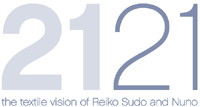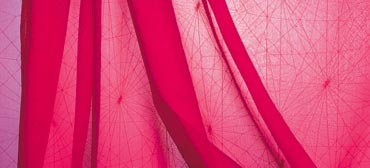
|
education programme : AMBIGUOUS SPACES Views of materials and materiality Held at the University College for the Creative Arts at Farnham on November 11th 2005 Reiko Sudo’s textiles are a conduit between artisan and highly technological, industrial practice; in her approach, she has placed her work in a deliberately ambiguous space, avoiding the categorisation of her textiles even to the point of having no designated front or back to her fabrics. Her textile titles are indicators rather than descriptors; our relationship with her textiles is dependent upon the position we choose to take up. She invites us to use her textiles as the vehicle for movement between a somatic and an imaginative response. She speaks of her textiles as “not just a pleasure to look at, they are a marvel to be experienced with all five senses: the feel of textiles in the hand or on the body, the periodic rustling sounds, even the taste on the lips.” This sensory approach is the unspoken narrative of textiles, that centrifugal shift from seeing to touching, which is wholly experiential. It could be described as the space between material and materiality; the space between the rigour of the making and the sublime outcome, in which the artist as maker is guided by her or his intuitive responses; the space between cloth and surface. It is the space between delicious anticipation, as exemplified by the following description of the textiles of Michiko Uehara: “The silk yarn chosen by Michiko Uehara for her work is very thin…..probably only spider’s web comes close to the fineness of this thread…..Not perceived by touching, the pieces embody the thin delicacy and existence of cloth only possibly glimpsed and experienced momentarily” 1, and the sensual bodily experience as described by Reiko Sudo above. This is a space that has no boundaries other than those we choose to set. Speakers on the day will be drawn from different areas of textile involvement, exploring ‘Ambiguous Spaces’ from their particular perspective. These will include textiles at the forefront of scientific, medical and engineering enquiry as discussed by the keynote speaker Matilda McQuaid, curator of the recent ‘Extreme Textiles’ at the Cooper-Hewitt Museum in New York and co-curator of the highly influential ‘Structure and Surface’ which opened at the Museum of Modern Art, New York in 1998. The author Bradley Quinn will discuss the links between fashion and architecture, curator and art historian Dr. Bojana Pejic will discuss the cathartic power of textiles exemplified by the politically charged work of Maja Bajevic. Practitioners Catherine Bertola, Philip Delamore, Julia Griffiths-Jones and Sophie Roet will discuss the ambiguous space that textile occupies within their own work. The day will be chaired by Dr. Polly Binns, textile artist and Professor of Visual Culture at Buckingham Chilterns University College Delegates were invited to conduct their own exploration in breakout groups, with their findings discussed in the final session of the day. 1. Yoko Imai, in The Persistence of Craft. Transformation of Textile Art: A Japanese Case Study. Ed Paul Greehalgh, 2002 A&C Black pp 136-7 |
Participants: Keynote speaker Other Speakers Dr. Bojana Pejic, Curator Catherine Bertola, Artist Sophie Roet, Textile practitioner Julia Griffiths Jones, Textile artist Philip Delamore, Research Fellow, London College of Fashion Chair
|


